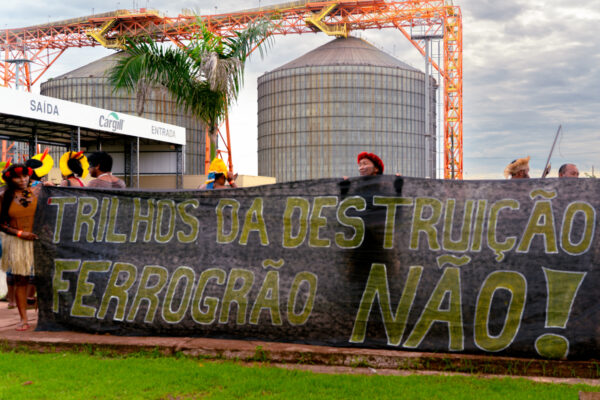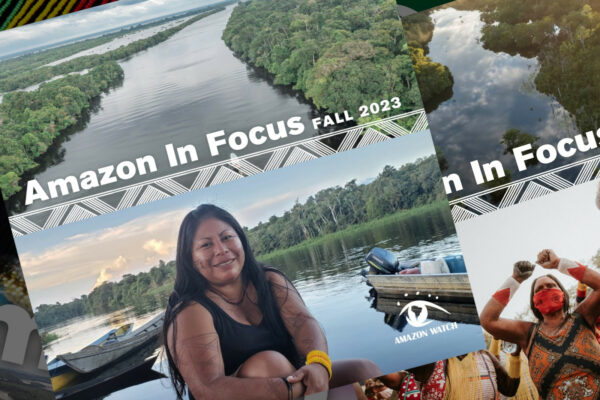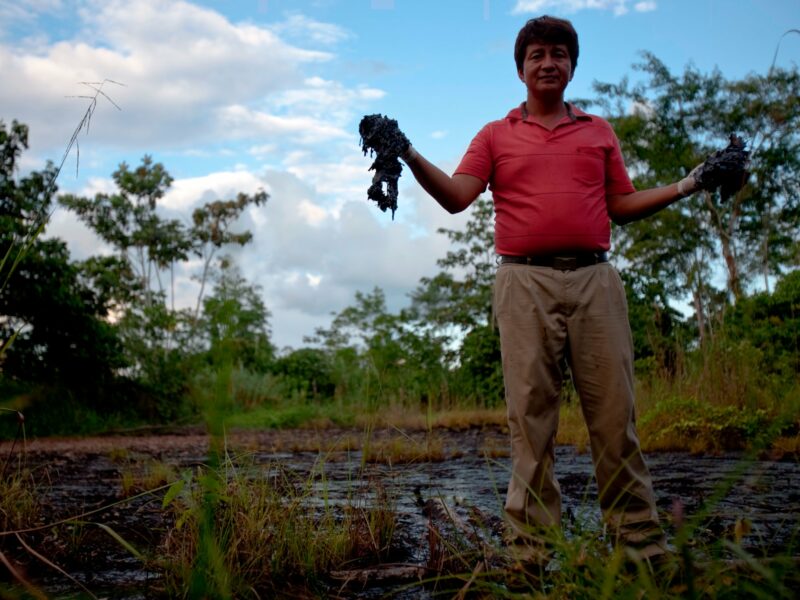Washington, D.C. – Four Ecuadorian leaders of an unprecedented environmental lawsuit against Chevron in the Amazon rainforest say their lives are in danger from a series of threats and a break-in, according to a legal petition filed today with the Inter-American Commission on Human Rights Commission of the Organization of American States.
The petition contends that the four individuals – all high-profile leaders of the first lawsuit to force an American oil company to stand trial in Latin America on environmental charges – have been victimized by death threats and break-ins tied to their work on the case. The petition asks the Commission to order the Ecuadorian government to protect the individuals, utilizing a rarely-used mechanism of international law under the Charter that created the Organization of American States in 1948.
“This has all the signs of a Watergate-style dirty tricks operation but with death threats mixed in,” said Alejandro Ponce Villacis, a lawyer who has been working with the plaintiffs, in reference to the threats.
“Chevron, which is a reputable company, needs to publicly and forcefully disavow any connection to these illegal activities and use its influence with Ecuador’s military to ensure that all participants in the trial are able to exercise their rights free of intimidation and threats,” added Ponce Villacis.
Chevron is vigorously defending itself in Ecuador against charges that it dumped more than 18 billion gallons of toxic waste water directly into the rainforest from 1964 to 1990, when Texaco (bought by Chevron in 2001) was the sole operating manager of a concession with Ecuador’s state-owned oil company. The lawsuit, tried in the jungle town of Lago Agrio, alleges that the dumping has led to the near-extinction of two indigenous tribes and skyrocketing rates of childhood leukemia, spontaneous miscarriages, and other petroleum-related health problems.
The company admits to the dumping, but claims the health problems are caused by a lack of personal “hygiene” among the rainforest dwellers and that it has no responsibility for clean-up after paying the Ecuadorian government $40 million for remediation in the 1990s.
The petition seeks protection for Pablo Fajardo Mendoza; the 33-year-old lead lawyer from Sushifindi; Alejandro Ponce Villacis, a 37-year-old lawyer and environmental activist from Quito; Ermel Chavez, 36, President of the Amazon Defense Coalition (ADC), the organization that brought the lawsuit on behalf of 30,000 residents of the region; and Luis Yanza, 43, the coordinator of the lawsuit for the ADC.
The petition alleges:
• That on Oct. 28, a computer and documents relating to the Chevron lawsuit were stolen from the law office of Ponce Villacis, while money and other items of value were left untouched. There was no sign of forced entry. According to the Quito-based human rights group Permanent Assembly for Human Rights (APDH), the break-in had telltale signs of an operation from a secret military intelligence unit often used to intimidate opponents of the government.
• That on Oct. 14, an anonymous caller to a human rights office where Fajardo Mendoza is employed said he was carrying out a “cleansing” of the region of politically undesirable elements, and that they knew “who works in the office” and where they live. Fajardo’s 28-year-old younger brother, Wilson, was murdered last year in the same area for unknown reasons, and Fajardo received death threats when he called on local authorities to investigate. (Wilson Fajardo did not work on the Chevron case.)
• That in October, plainclothes security agents who identified themselves as military intelligence from Special Forces Lightning 24, housed on a military base in Lago Agrio where Chevron’s legal team lives, visited the home of Chavez Parra to ask family members about his work and whereabouts. The agents were later seen observing the FDA offices from the same green sport utility vehicle used to transport them to Chavez’s home during the earlier visit.
• That Yanza’s whereabouts and phone calls are being monitored by military intelligence officers from Special Forces Lightning 24, according to police sources in Lago Agrio.
• That men who appeared to be Chevron’s private security officials – believed to be ex-military officers from Ecuador’s army – were secretly videotaping Yanza, Fajardo, and Ponce when they were questioning the commander of the local military base on Oct. 19.
The trial, which began in 2003, has intensified in recent weeks with calls for Chevron’s lawyers and technical experts to cease collaborating with members of the Ecuadorian military. In addition to living on the military base, Chevron’s lawyers use army soldiers to do much of their manual labor during judicial inspections of the contaminated sites.
In mid-October, the lawyers accused Chevron of working with an army military intelligence officer to fabricate a report that claimed indigenous leaders planned to kidnap Chevron’s lawyers. The judge used the report to suspend a judicial inspection where indigenous leaders were set to testify against the company. The report was disavowed the next day by Lt. Col. Francisco Narvaez, the commander of the local military base, and its author is under investigation by the army high command, according to the petition.
A study by an American firm, Global Environmental Operations, concluded in 2003 that a clean-up of the area would cost at least $6.14 billion and could take ten to fifteen years. The author of the study, David Russell, said he believed the pollution was the worst oil-related environmental contamination on the planet, surpassing the Valdez spill by at least thirty times.
Chevron has refused all calls to settle the case. In a move roundly criticized by the Ecuadorian trial leaders, Chevron’s general counsel, Edward J. Scott, flew to Quito last August to press the company’s position in an unannounced meeting with Ecuador President Alfredo Palacio. The meeting came to light several days later when a presidential aide leaked it to the Ecuadorian press.
At the time, Yanza accused Chevron of trying to use its political influence to interfere in the judicial process.
The petition was filed by Center for Justice and International Law, a non-governmental organization based in Washington D.C. that represents individuals with human rights claims, and Amazon Watch, an environmental organization in San Francisco that works with the communities and indigenous groups that brought the lawsuit against Chevron.
While the threats appear to come from military intelligence units, it is not unusual for the Commission to ask high-level officials from the same government to take precautionary measures to ensure that the activities cease immediately and that security be provided to all persons in jeopardy.
“Filing this petition is one of the few viable legal options in situations where peoples’ lives are in danger,” said Atossa Soltani, Executive Director of Amazon Watch. “The international scrutiny is often very effective at preventing violence.”
# # #













